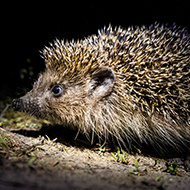Report shows large decline in rural hedgehog populations

Data from the report suggests that the largest declines in Britain's countryside hedgehog population are in the eastern half of England.
New figures from the State of Britain's Hedgehogs 2022 report have shown that the hedgehog population in rural areas of Britain has declined by 35 to 77 per cent over the past 25 years.
Published by People's Trust for Endangered Species (PTES) and the British Hedgehog Preservation Society (BHPS), the report is the only comprehensive review of the status of hedgehogs in the UK, and uses data from different wildlife surveys to analyse population trends.
As the report details, whilst the hedgehog population is stable and may be recovering in urban areas, the hedgehog population in rural areas has declined significantly, with the largest declines occurring in the eastern half of England.
In a section of the report entitled, 'Why are hedgehog numbers falling?' the PTES and BHPS said that: “The reasons for the decline in hedgehog populations, apparent in the last twenty or more years, aren’t fully understood yet.
“Pointing the finger at a single cause, such as predation by badgers or road casualties, likely misses the bigger, more complex picture.
“Research funded by PTES, the British Hedgehog Preservation Society (BHPS) and others in the last decade has improved understanding of rural hedgehogs. They prefer villages to open farmland, particularly arable land, and follow field margins and hedgerows.
“Badgers and major roads have a negative impact and might threaten populations locally, but even where badgers are absent, hedgehogs choose areas in villages rather than farmland habitats.
“Foremost of the pressures that hedgehogs face is an impoverished environment. The loss of landscape features such as hedgerows is responsible in part but isn’t the whole story.
“An estimated half of Britain’s hedgerows were lost in the second half of the last century, but in the last twenty years efforts have been made to restore and improve them.
“A lot more can be done, but we also need to look at other aspects of the countryside: at the management of field margins and soils, and the number and abundance of invertebrate species; at connectivity in the landscape, linking habitats and populations; at climate change; and at the interaction of species in a changing environment.”



 HMRC has invited feedback to its communications regarding the employment status of locum vets and vet nurses.
HMRC has invited feedback to its communications regarding the employment status of locum vets and vet nurses.